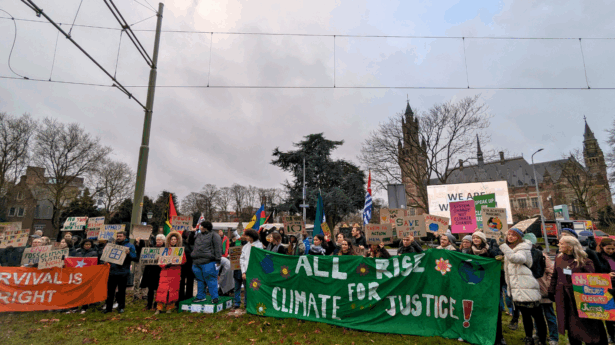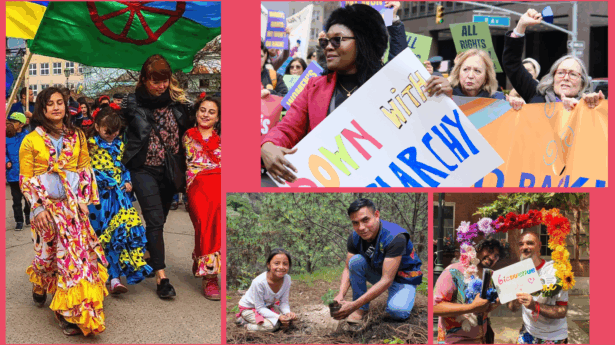The Unitarian Universalist Service Committee advances human rights through grassroots collaborations.
(Volunteers + Ideas) x (Resources and Network) = More Justice
July 22, 2016
UUSC’s First Justice-Building Innovators Launch Programs to Advance Human Rights
Early in 2016, UUSC selected its first class of 16 Justice-Building Innovators, sponsored by nine congregations and supported by UU advocacy networks throughout the United States. During projects lasting 18 months or more, these innovators are developing programs to engage their congregations, colleagues, and communities in tackling human rights issues close to home and, in some cases, state-wide.
Rev. Paul Langston-Daley who is leading this effort for UUSC explains that during the multi-year commitment period, UUSC provides three in-person leadership development gatherings, monthly personal coaching calls, topical and networking webinars, and access to various organizing tools and techniques.
“With our Justice-building Innovators program, we provide the structure, network, and resources. You supply the ideas and innovations.” -Rev. Paul Langston-Daley, UUSC Senior Program Leader for Justice-Building
“The JBI program is designed to support congregations – wherever they are in their understanding and practice of justice – to take a significant leap forward in terms of the scale, scope, focus, and impact of their efforts. Unitarian Universalists have a proud history of being some pretty audacious change agents. Given the conditions we face as a nation and world, we look to the Justice-Building Innovators (JBIs) to reclaim that gutsiness, and with a 21st century vision of the Beloved Community, use their and their congregation’s power to really make a difference,” says Pamela Sparr, Associate Director for UUSC’s Justice-Building Program.
“This first class of JBIs has devised projects that are essentially of two different types,” notes Langston-Daley. The first are what Sparr and Langston-Daley call “foundational organizing,” identifying priority issues and mobilizing key leaders in congregations to explore the connections between these issues and possible solutions. The goal of these projects is to engage in joint strategic planning, with support and resources provided by UUSC.
Julia Cochrane in Washington state and Jack Gaede in Minnesota are developing these kinds of projects, as is Elias Ortega in New Jersey. Ortega’s plans include creating anti-racism education and organizing programs with all UU congregations in New Jersey, and reaching out to other organizations across the state, including with the Black Lives Matter Movement. These three JBIs hope their three state-wide projects will produce a double benefit – strengthening their state and regional UU advocacy networks, as well as the capacity of the individual congregations involved. In Madison, Wisconsin, Ian Shay is developing a related foundational project, forming a joint impact assessment team including his congregation and various community groups his church has already supported in the past.
As a longtime community organizer, Sparr is enthusiastic about how these foundational planning programs are reaching out to other organizations. “It’s one thing to evaluate your work yourself, but it’s so much more powerful to invite your community partners to provide honest feedback. Ian’s project has the potential to be a case study for how to do this well, and for how to then reformulate the church’s justice ministries based on the findings of this assessment.”
The second group of Justice-Building Innovator projects include congregations creating new ways to address social justice issues in their communities. A few examples of these innovators programs are:
Kenneth Jones, who is leading his Houston congregation through the process of formally becoming a sanctuary congregation. His city is home to many Central American immigrants and asylum-seekers. Kenneth wants his church to be able to offer protection against immediate deportations for the most vulnerable individuals and families.
In Chicago, Gabriel Gamez, Jr., is working with young adults from six area congregations on a restorative justice program for incarcerated people. His goal is to collectively advocate for an end to solitary confinement, and to develop mentoring relationships with LGBTQ people recently returned from incarceration to promote their reintegration into their communities.
The six congregations in the Greater Milwaukee Metro area do not have much of a history of working together. Ann Heidkamp and Mary Devitt want to change that by creating a highly visible and reliable presence in local racial justice efforts, particularly the Black Lives Matter Movement and actions to improve the relationship between community residents and the Milwaukee Police Department. Ann Heidkamp is enthusiastic about the work ahead. “The Justice-Building Innovators program helps us engage our congregation in education work around issues of racial justice, so we can prepare ourselves to be active and effective partners in our work with other organizations and individuals in Milwaukee.”
Both types of projects being launched by this year’s first class of Justice-Building Innovators have the potential of reaching over 20,000 Unitarian Universalists and even more residents of the communities where the Innovators live. The diverse nature of their work, and the positive response from clergy and lay leaders to their pioneering efforts, is encouraging evidence that the JBI program is meeting a real need.
Bryce Thomason of Atlanta, Georgia, an enthusiastic member of this first class of JBIs, notes, “Our congregation has a very rich history of doing social justice work, which is especially important here in the South. This new program has enabled us to use the results of surveys and other resources to build a new format for planning our activities: to explore when to apply ourselves to social justice, what pitfalls to avoid, and what makes for successful work with the community. We now have resources we couldn’t access before, like leadership training, a peer network representing diverse congregations, and the opportunity to share our learning with others to create exponential growth. It’s fulfilling to me to have new tools we can use to help other people.”

